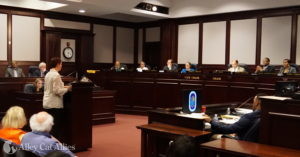Alley Cat Allies worked closely with Maryland county to change animal control laws
Thanks to the tireless work of Alley Cat Allies, local advocates and officials, Prince George’s County, Maryland, unanimously passed an ordinance on November 19th that endorses countywide use of Trap-Neuter-Return (TNR) to protect community, also known as feral or stray, cats. Prince George’s County is the second most populous county in Maryland.

Alley Cat Allies President and Founder Becky Robinson at the Prince George’s County administration building, where a bill to protect community cats just unanimously passed.
“Prince George’s County now joins thousands of other communities across the country who value, respect and protect the cats who live among us by embracing TNR,” says Becky Robinson, president and founder of Alley Cat Allies.
The importance of Prince George’s County adopting TNR cannot be understated. Robinson and our advocacy team worked closely with elected officials, municipal leaders and advocates for many years to ensure that the county took the right steps to adopt a nonlethal policy and program that benefits cats and residents. Now with this new victory, the humane values of county residents are more strongly reflected.
Alley Cat Allies advocated for amendments that define and support TNR, state that community cats are not “at-large” since they reside outdoors, ensure community cats aren’t impounded as a “public nuisance” just for living outdoors unlicensed, and allow community cat caregivers to feed, shelter, and carry out TNR. All these changes were included in the new ordinance, which also strengthens the definition of animal cruelty by adding psychological and emotional harm to the existing definition that includes physical harm.

Becky Robinson addresses the Prince George’s County Council on November 19, 2019, in honor of the important new ordinance.
Bowie, the largest city in the county, and the City of Laurel had already adopted TNR policies years ago. The county also passed an eartip ordinance seven years ago, which states that any animal control officer who traps or responds to a trapped eartipped cat in the field is required to release the cat back at the location where she was trapped, unless the cat shows signs of injury or illness.
We deeply thank each and every one of our supporters, advocates, organizations, and officials who helped facilitate this important step forward for cats and people in the Prince George’s County community, especially Laurel Cats Inc.


